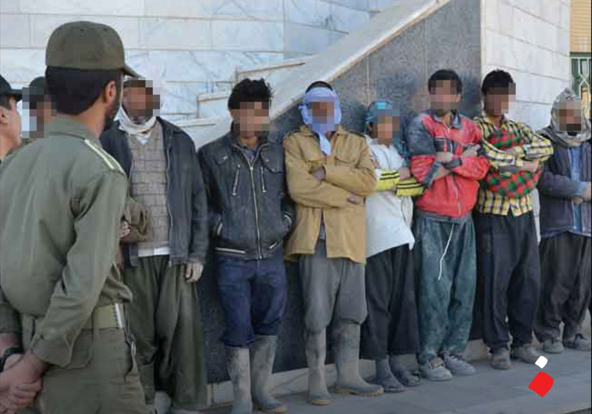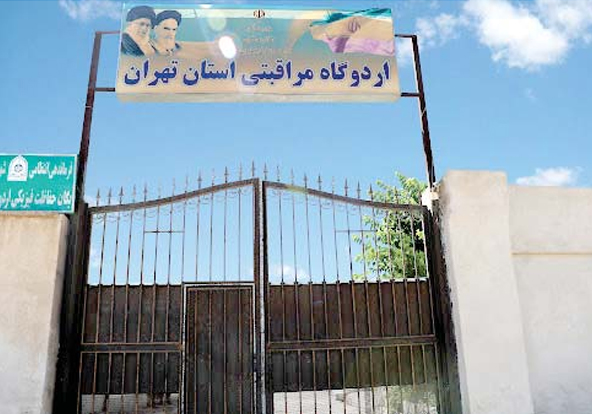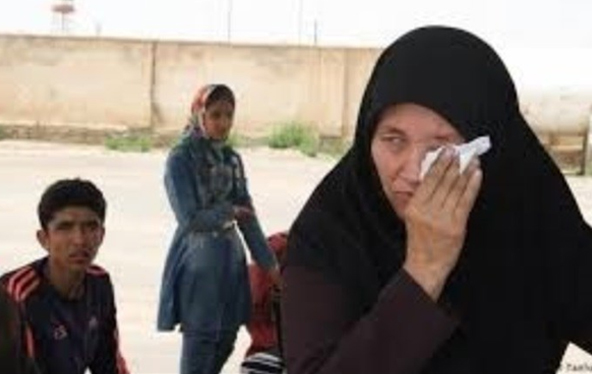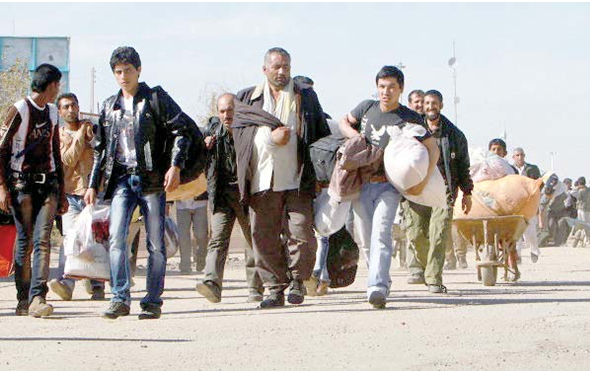IDR Blog
The Story of the Afghans Deportation!

“Afghan Capturers” in Askarabad of Tehran
Places and Regions
Places, locations, and regions are usually remembered and continued for the one or two specific characteristics they may have. One has seen the village of Masouleh has the memory of the beauty of human life in the heart of the forest. And one has seen the beautiful beaches of Bushehr has kept the depth of the sea in their minds. This time, we hear from “Askarabad of Tehran,” and those were forced to enter this village in the Varamin district of Tehran. “Askarabad” is not a familiar and memorable name for the Iranian people. It is neither a tourist attraction nor a place considered a cultural-civilizational or economic-political symbol there. but for many of the Afghan immigrants, this is not the case. “Askarabad” reminds them of night and homelessness. It is a reminder of the pain, humiliation, and urgency that testify to their forgetfulness, not as an immigrant but as a human being.
Unfamiliar Strangers
Afghanistan was invaded and occupied by the Soviet Union at the same time as the revolution’s victory in Iran, which caused millions of Afghans to emigrate to Iran. During these years, although many refugees returned to their homeland at times. The unfavorable conditions in Afghanistan, like (civil war, Taliban, and insecurity) have caused many of them to stay in Iran for a long time. In a way, today, we are witnessing the presence of the third generation of Afghan immigrants who are born here. Therefore, they go to school and grow up with the culture of the Iranian society. They are employed here, married and etcetera. And for many of them, Iran may not have found the role of “second home,” but it’s as first and last of their home. On the other side of this story are the Afghan immigrants in Iran, for Iranian society has always been “another and unfamiliar” despite all the commonalities, never been. It has not been “insider or familiar.” Sometimes it is reported that the bank accounts of Afghan refugees are blocked and closed. The mobile operators no longer issue SIM cards in the name of Afghan refugees. These provinces are “forbidden provinces” for migrants or restrictions such as having a Driver’s license and a list of permitted occupations of Afghan immigrants in Iran and etcetera. These are just a handful of examples that indicate the facts. The long stories of Afghan immigrants in Iran do not only contain white and luminous pages of empathy and co-language. Also, there are dark pages among these that are unfortunately less discussed.

The Bitter Story of Askarabad Camp
The story of “Askarabad” is also one of the bitter memories and pages of this long story. Here it is better I tell you a little about the camp’s history and after what is happening in this camp. As you know, the Askarabad headquarters is located in the district of Varamin in Tehran, and it is used to hold Afghan refugees in Iran. This camp was established in 2004. Afghan migrants who have come to Iran illegally from Afghanistan or those with an identity card but are not with them are taken to the camp and inspected. Suppose it is determined that illegal immigrants have entered the country. They will be returned to Afghanistan from Iran after being transferred to the Dugharun border. Illegal immigrants are likely to be arrested and detained upon arrival in Iran. The length of their stay in Iran, from one day to several years, depends on their luck when they are arrested. Therefore, they usually live on the outskirts of the cities and places where they can stay for a while and appear less in the city. At the time of arrest, they carry it out as far as possible, and in many cases, they struggle to get rid of the officers when they are arrested. The experience of arresting legal immigrants also happens to many immigrants in Iran. Let me tell you about a handful of examples of the author’s family members, who had an utterly lawful presence in Iran for decades. My father and three of my brothers have such a bitter experience. They always carry the memory of deportation, and it bothers and weighs heavily on them.
Notable Immigrant Compatriots
Therefore, among Afghan immigrants, both legal and illegal immigrants. There is very a common term called “Capture Afghan” (Afghans Deportation), which refers to police patrols in Iran. Even Mr. Abdullah, a footman of a bakery in one of the neighborhoods of the Varamin district, has the experience of “Capture Afghan.” When the police officers arrested Abdullah, he did not have his national card and identity card in his pockets at the workplace. Whatever he said in a sweet Turkish accent, “By God, I swear to God, I am not Afghan,” but the police officer did not believe him and then arrested him. After this incident, whenever I went to the bakery to bring bread, I would jokingly say: Mr. Abdullah, please tell me about the taste of being “Afghan” in Iran! So, Abdullah himself is an Iranian citizen from Turkish ethnic in Iran.
Fear and Panic in the Workers’ Square
When police patrols carry out the “gathering illegal aliens plan.” Or in the words of immigrants, the “Afghans Capture Plan” with greater intensity and unity, the combination and terms “Capture Afghan” and “Capture and Capture” are more used among the immigrants. In such cases, everyone tries to inform other immigrants, especially immigrants without identification documents. This way has become more common in recent years due to the expansion of social networks in information. Before Nowruz-Eid (Persian New Year), many immigrants echoed social media and cyberspace messages that served as information about the “Afghan Capture.” note and Remarkable immigrant compatriots! “Today was in some parts of the city “Capture Afghan” (Capture and Capture) do not leave your rooms and homes without a document. and inform undocumented immigrants not to travel in the mentioned areas today!” The phrase “Capture & Capture” is very familiar and strange to Afghan immigrants in Iran.
When an Afghan immigrant hears the term “Capture and Capture,” a meaning comes to mind that is different from what an Iranian listener feels and understands from the ground to the sky. For an Afghan immigrant, “catch and catch” means a constant alarm in his life. “Catch & catch” means to stop and arrest. “Catch &catch” means sometimes forced labor at the checkpoints and camps. “catch &catch.” It means “here is not your land.” meaning like Askarabad, Sorkheh, and SafidSang…So, the SafidSang camp is the most horrible care camp for Afghan refugees in Iran. And it is located in the Fariman region in Khorasan-e Razavi province!
Shut up!Why Do Not You Return to Your Country?
Perhaps the story of one of the Afghan immigrants from the night experience in Askarabad camp makes the details more tangible for the readers: “It was a cold morning. The street was long, and the workers’ square was very far away. I had to get up early and walk to chasing work. I accelerated my steps to reach the square before sunrise. It was our daily work. Around the square, we stood in front of the cars of all models. We were Looking for our daily livelihood in the words of people who shouted! I want a bright and clever worker, and I have no patience for extra things. You go ahead and say that I will carry stones on my shoulders, say how much money do you give me? And he says whatever the price is, and then he gives you the lowest price. You have to accept among all the workers in need not become unemployed and wonder of that day. Get in his car on and work drudged until the evening and tried so hard, and you fall into your room like an unconscious dead at night and repeat the same route for tomorrow morning.
 The Cries of Mothers and Children
The Cries of Mothers and Children
Therefore, I arrived at the square. I was sitting next to the yard for about half an hour. I was waiting for someone to come and go to work. Once, I heard a shout saying, “Capture Afghan,” everyone fled from the square. Until I came to shake myself and escape, I found myself surrounded by several soldiers. One of the soldiers grabbed my collar and pulled me to the minibus parked ten steps away from us and said, “Quick, get on!” I said, “For what?” “Shut up!” he said. He lifted his baton, and I got on the car before lowering it. Hence, the officer said, “Why don’t you go back to your country? You have become very impudent here, and We lacked just this one”. Fear had crept into my whole body being. The minibus accelerated a bit a few times and set off. I sat on a chair and looked out of its opaque windows. No one was around the square there, as if everyone knew they had to escape when this minibus came. There were a few other Afghan workers on the minibus like me. We got up from the chairs and said we had immigration cards in Iran. But Nobody paid attention. Only one of the soldiers got up and shouted, “Go and sit down, to hell! that you have a card, now it’s clear whether you have an immigration card or not”. I said, at least let’s call our family. The officers said no one had the right to contact and they did not allow us. The minibus was moving along the road. Suddenly they saw another afghan worker walking towards the square. The minibus stopped next to him, and the soldier got off. The worker, whose eyes saw the minibus, fled as if he had seen his bloody enemy. So, two of the soldiers followed him. He looked behind him as he was running every step of the way. Desperately, he walked through the thorn bushes across the road. He was out of breath. We only saw a picture of two soldiers and a worker from Afghanistan. We did not hear their voices of them anymore. Then he was forced to stand on his feet and not run away anymore. The soldier shouted to him, “Ride!” The worker said with disgust and tears, “I have an immigration card. Why are you beating me?”
 Bitter and Unforgettable Memories
Bitter and Unforgettable Memories
However; We all arrived at the camp. Dozens of people, from women and children to older men and women, Afghans and Iranians, gathered in front of the base, each of them saying something. One was crying. One called somewhere, and one went to inside the camp; each was full of anxiety, worry, and sadness. They took us inside and put us behind a door. We sat and stood there for several hours when some soldiers came and started to inspect us and then take us inside the camp. It was near the sunset when we went inside the center. There was a nasty smell coming from everywhere. The health condition was very bad and poor in camp. It was dirty and disordered around, and They took us to a very long room but narrow. There were already 20 or 30 people in these rooms. The soldiers entered and squeezed us on top of them; a total of them were about 40 or 50 people in a small room.
My head hurt, and I was confused. I was nauseous. There was no place for me to lie down properly. I sat in a corner, hugged my knees, and started to cry. I was tired of this fate we had suffered, a homeland full of war, and the humiliation that was crushing my back. I fell asleep. When I woke up, it was getting dark. I slept for two or three hours. My feet and legs were numb. I was confused. I looked at my other compatriots and the walls. Memorabilia was written everywhere on the walls: a relic of Bismillah in 2016; “Remembering to the name joys of the dead; here is the end of the world; My heart and soul are burned”in another corner of the wall, one named ‘Reza’ wrote:
Let’s leave this province, me and you
Hold you my hands, and me your skirts…
Everyone was saying something. Someone who did not seem to have an immigration card told his younger brother that he was now alone in this strange city. One of them said about his money that he has not yet received from his work owners. If he is deported forcibly to Afghanistan, all his efforts may be wasted in the few years he worked in Iran. And one of them was sitting and singing Ahmad Zahir’s song with sadness and tears in his eyes: “Look at me, my beautiful, I cannot stand your separation …” It was a cold night. They did not bring us a blanket. The only thing that kept us warm was the hustle and bustle of the room and the knees we hugged. I was feverish and tired of thinking about war. I was thinking about the oppressed Fortune of Afghanistan. I was thinking about my family and expecting something I did not know. I could not sleep that night, and then It was morning. My arms and legs were numb. I pushed myself towards the door of the room and got up. I slammed the door very hard and said, open the door! After a few moments, a soldier came and shouted, “What’s up? and what happened?” I said, “I have a residence card. Let me call my family till they can bring my card.” Finally, around 10 o’clock, they allowed me to call my family. It took until about evening for my brother to get there. “I was released from Askarabad camp that day, but the memory of that place will not leave me forever.”
Note: This article also published in the Iran “Sharghdaily”, its available in this link: https://b2n.ir/sharghdaily.com.atai
This Non-Fiction Story Translated from the Persian
Post your Comment
One thought on “The Story of the Afghans Deportation!”
 Loading Comments
Loading Comments




Indeed!
When Arabs invaded Persia in 600c, they massacred Zoroastrians of Iran( Persia) & FORCED CONVERSION took place in millions with Zoroastrians of Persia!
We were then 30 million, today, we are just One hundred thousand in the world!
To save our Zoroastrian religion which is dearer than life.
Our Sages, then, said to live Iran for India.
In India, we are called Parsis, came from Pars Province of Iran through the Strait of Hormuz!
AS MAHATMA GANDHI SAID ONCE ON PARSIS: “THE POPULATION BENEATH THE CONTEMPT BUT CONTRIBUTION BEYOND THE COMPARE…”!
We are grateful to the Hindu Rajput King Jadi Rana for settlement in India.
Jai Hind!